Among many pictures of Petra, the Citadel, and other landmarks of Jordan few capture everyday life in the Hashemite Kingdom like those shot by Baha Suleiman. No wonder the nineteen-year-old photographer has been already appreciated twice by GQ magazine
Baha was born in his grandmother’s house in East Amman, which still remains one of his favourite places in the capital of Jordan. However, he grew up in the centre of the city, because his mother decided to move from the East to Jabal Al Weibdeh when he was eight. This Christian neighbourhood in the 90s was considered a chilled and open-minded place closer to the city’s center. Nowadays it is a hotspot for foreigners studying Arabic, changing the demographics of one of the oldest districts in Amman. Commenting on the development of the district Baha is torn:
‘A part of this gentrification is good. Shops and businesses make profit out of it. But the city loses its unique identity, its colours’.
Beginnings
Baha’s uncle was a photographer, so instead of pictures of family members, his house was full of artistic photos. Young Baha admired the pictures, and since the age of 10, when his mother gifted him a camera, he has been making photographs himself: ‘Ever since getting that camera, I’ve been taking pictures’. To this day his uncle remains his main source of inspiration and role model. Baha even wears similar sunglasses as his uncle did and when looking at pictures of the two one cannot help but see the resemblance.

‘I always liked film. There are a lot of reasons why people like film, because of the aesthetic or the colours. But I like it because it gives you a specific connection to your pictures. There is a limited amount of frames on the film, so you have to put more effort into shooting the pictures’.
The safe space
Baha used to develop his films in a studio in downtown Amman. However, for Jordanians, it was uncommon to photograph other subjects than family and relatives, so when in 2021 the owners of the first professional darkroom in Jordan reached out to him and offered him to work with them, he immediately accepted. This darkroom became somewhat of a safe space for Baha, giving him privacy and the ability to handle pictures in a professional way. ‘I’ve taken over 5000 or 6000 film pictures. Most of them within a year’.

Growing up at the edge of Amman and then moving to Weibdeh, gave Baha a unique perspective on the city. ‘What I like about Amman is that any direction you go, it is very different. I think when you come from a certain area, and you go to a different area to take pictures, there’s something more interesting because you look at certain parts that the average person who passes by that street every day wouldn’t have’.
Every city looks ugly
When you meet Baha on the street, he will always have a camera on him. ‘I try to take pictures of the same streets every day. Essentially, I walk the same routes a million times every day. If I’m able to take pictures every day, that means that my eyes still work’.
Baha Suleiman believes every city looks ugly from afar and it is only the small details and small moments that make it beautiful. That is why his pictures are a ‘zoom-in’ on Amman. Baha zooms in on writings on the walls, small alleys, people during prayer. ‘I don’t think a city has to be pretty for the pictures to be nice’, he says with a grin on his face and continues speaking about the pictures of Jordan and Amman you find online and how far they are from daily life. ‘I think that my pictures resemble Amman from my point of view, as someone who lives there. When foreigners see my photos, I feel like they were bringing a more realistic image of the country’, he adds.

Walking through downtown, Weibdeh and Jabal Amman with him feels like walking with a celebrity who has lived in Amman for ages. He knows the tiniest alleys, rooftops to watch the sunset, the best book and vintage shops. He is greeted warmly by people on the streets or friends he runs into. One can feel that he has made himself a name in the city.
‘It felt unreal’
Three of his photographs are painted as murals on buildings in Amman. Baha took pictures of living rooms and a kitchen for a project that were then painted by the muralist Dalal Mitwali. ‘Every day, when they were painting it, I would stare at them because it felt so unreal. They are one of the reasons that made me like Amman more because I can’t take them with me’, he recalls. The murals can be found in the area that Baha Suleiman calls his home.
Baha’s family is Palestinian and had to flee in the 60s. When asked if he feels Jordanian, Baha responds: ‘I’ve lived in Jordan my whole life, but I don’t feel like I am from here. I was just placed here’. Even though around half of the population of Jordan is originally Palestinian, Baha experienced racism and bullying in school because his surname is not Jordanian. He was considered a refugee instead of an equal classmate.
The ceiling
Having lived in Amman his entire life, Baha feels some resentment towards what he considers a limiting environment: ‘Jordan is an OK country, but it’s very limited. Eventually, you will hit the ceiling. And if you don’t break the ceiling, the ceiling will break you. Sadly, most of the people that are good at what they do, leave Jordan’.


To a certain extent, Baha considers Amman his home because he grew up in the city and his family lives there. However, he says: ‘I think you can create a home anywhere. So I could live somewhere else and that would become home’. He has a sort of love-hate relationship with Amman and when he tries to describe it, it sounds confusing: ‘I love it but I don’t like it’. In a way, there is a lot he likes about Amman and the hate mostly stems from the fact that it holds Baha back from his opportunities.
Sometimes Baha is close to giving up his hope, as he says, he always has been. However, he sees his creativity and photography as a tool to break the ceiling.
DJing? A selfish thing
In his free time, Baha DJs at a club in Amman or on Radio Al Hara, an online radio station located in Bethlehem, Palestine. Music has always played a big role for his family and as a kid he would collect tapes and records. ‘One day I realised, I can play music and I can DJ. I can play music that I like and that my friends like out loud. DJing is a very selfish thing. Because I just want to hear my music playing very loud without anyone telling me not to’.

DJing is only a hobby, and he does not plan to do it professionally. His monthly show on Radio al Hara is a place where he plays the music he listened to most and he elaborates: ‘how I feel that month in music is what I play on my show’. He mostly prepares his DJ sets in the darkroom, which has become his personal studio. The walls are decorated with a plethora of his images and the shelves are stacked with various cameras.
Sadly, I would move to Europe
His studio is on the premises of and funded by the Mohammad and Mahera Abu Ghazaleh Foundation for Art and Culture which invites artists for residency. When Baha is not playing his sets in the club, he takes pictures of the dancing crowd. His gaze is always on the hunt for a new picture, even at night and his camera is ready to capture it at all times.
In the future, Baha plans to move to the UK to go to university, work in darkrooms outside of Jordan to meet new people and experience the challenge of going to a new place and starting from the bottom. ‘I think there’s something nice about starting from the beginning’. However, his choice to move to the UK is not completely free: ‘If I could move anywhere and Palestine was free, I would obviously move to Palestine. But for now, sadly I would move to Europe. Sadly’.
Hannah Lettl studies International Relations at the University of Wroclaw, Poland, and has lived in Berlin, Capetown and Amman. She is especially interested in refugee related topics and international politics.



